The phrase “family business” may conjure visions of mom and pop working behind the counter at a small retail store…but family business is big business. About 35% of Fortune 500 companies are family-operated, and there are over 5.5 million family-run businesses in the United States, contributing to well over 50% of the GDP.
Some of them may be small, but not all of them are, and family businesses drive the U.S. economy.
When starting up a business, hiring members of one’s family may seem like a reasonable first step, and the family business owners we talked to seem quite happy about the way their family businesses are going… and some have been going an exceptionally long time.
Gina Bolger, Sr. Vice President of Marketing, Home Run Pizza

“Giving back to the communities we serve is what makes our hearts sing at Home Run Inn.”
Some of the first pizza pies in Chicago were served in taverns, many times free of charge, as a kind of salty snack to pique the thirst and encourage the imbibing of more of what the tavern was selling. Unlike the perhaps better-known deep dish pizza, which wasn’t developed until later, this “tavern style” pizza was thin and cut into a grid pattern, so that people sitting around the bar could grab a piece now and again. From those humble beginnings was born Chicago’s own Home Run Pizza.
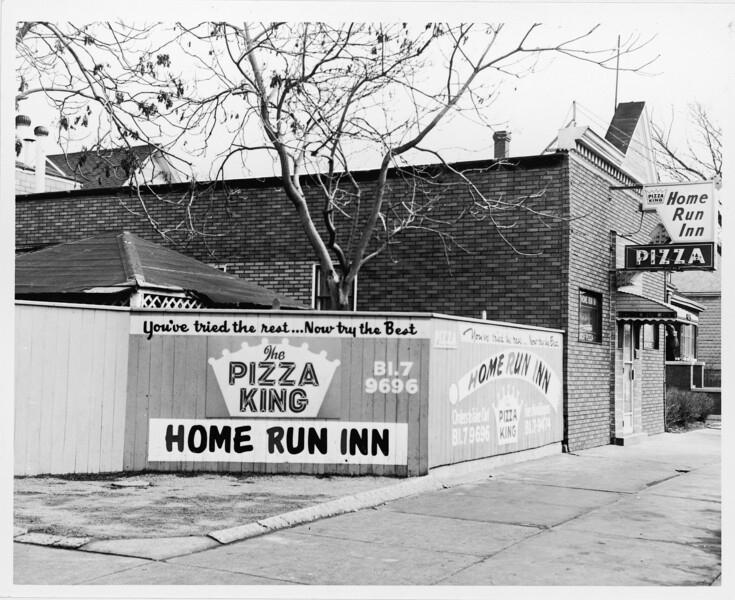
“In the 1940s, we had a tavern on the south side of Chicago,” Gina Bolger says. “Our grandparents were Italian immigrants and didn’t have much money, so they started putting pizza (a recipe they knew from home) out on the bar for customers. They quickly realized the pizza was a hit, so they started to charge for it; the rest is history.”
Post-war America witnessed the rising popularity of frozen foods, and so Bolger’s family moved into frozen pizza. “They had no idea how powerful a move this would be for our future,” Bolger says. “They got this idea from listening to a long-time customer who used to come in and order his pizza parbaked so that he could drive it home to Wisconsin and freeze it to be baked later. Today our frozen pizzas can be found in over 45 states, and I think my father and grandfather would absolutely love to see where we are now, considering we were one of the very first frozen pizzas to hit the grocery shelves.”

As with so many family businesses, those that achieve success feel the urge to say “thanks” to the large community, and Bolger tells us that “giving back to the communities we serve is what makes our hearts sing at Home Run Inn. Each year we donate over 30,000 pizzas to local food pantries to help families in need and feed over 120,000 people. Throughout the pandemic, we’ve also been able to feed thousands of frontline heroes. In addition, we partner with organizations such as Feed My Starving Children and Ann & Robert H. Lurie Children’s Hospital of Chicago. We’re very proud to be able to serve these organizations: they are near and dear to our hearts.”
This community awareness goes far beyond Chicagoland in such initiatives as the company’s efforts to limit environmental impact. To that end, Bolger told us, “all Home Run Inn boxes are recyclable, and we’re aiming to have a 75% reduction in plastics used throughout our business by early 2024.”
William Terlato, CEO, Terlato Wines
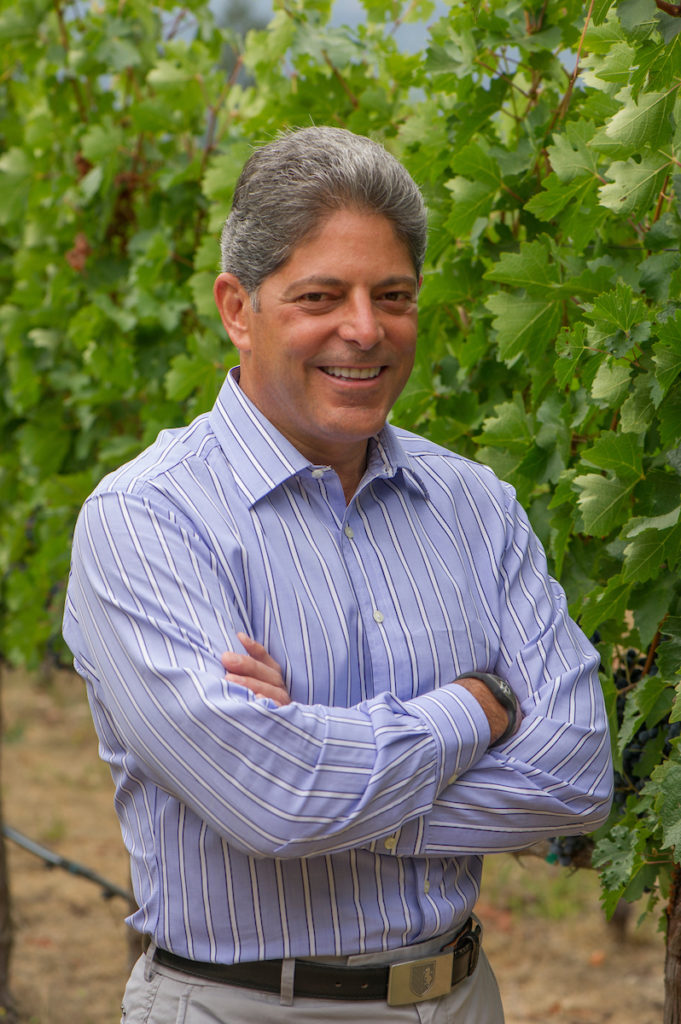
“We are here briefly and need to leave the world a better place than when we arrived.”
Terlato is the leading wine and spirits marketer in the United States, with an international portfolio of over 85 wine and artisanal spirit brands.
Williams Terlato tells us that their family’s wine business began in 1938, when Terlato’s grandparents opened retail shops. Now in their fourth generation, they are winery owners and vineyard developers with worldwide reach, a 2 million case and spirits company with seven divisions.
As with many highly successful companies, Terlato has the shared vision and values that guide their business and their path forward. “We look at all major decisions with an eye toward the future and how those decisions will impact the next generation,” says Terlato. “We don’t make short term or improvised choices just to appease shareholders. Not being a public company that’s focused on short and mid-term results, we invest for the long-term, and we choose to partner with family-owned companies whose vision, values, and behaviors align with our company’s values.”
Reflecting on his company’s achievements, Terlato says “Every organization faces adversity, and the best ones thrive in that environment, constantly evaluating and reinventing themselves to adapt to a changing environment, making continuous improvements with a long-term vision. I’m incredibly proud of the journey we have been on for the past eight decades. We’ve transformed our family business from a local retailer and distributer to an international importer and now owners of dozens of brands, wineries, and vineyards around the world. In the process, we’ve also helped the families we represent build their brands and realize all their dreams for their families. “
Along the way, Terlato and company have found time to give back to the community. “Terlato Wine Group is committed to supporting and strengthening the communities where we live and work. Our objective is to make a meaningful difference in people’s lives by leaving a positive and lasting impact. There are many worthy organizations, and we are honored to partner with a variety of non-profits with a focus on education, health, and community initiatives. We support these efforts locally, nationally, and internationally.
“We are here briefly and need to leave the world a better place than when we arrived. Of the 100 oldest businesses in the world, 10 of them are wineries. Family ownership and being stewards and caring for the land allows for this type of longevity. As such, sustainability requires a long-term perspective — one that we fully embrace. We view ownership and participation in terms of generations. Our responsibility is to leave our surrounding environment in better condition than we found it, and it is this responsibility that guides our processes.”
Imani Muhammad, Owner/Chef, Imani’s Originals
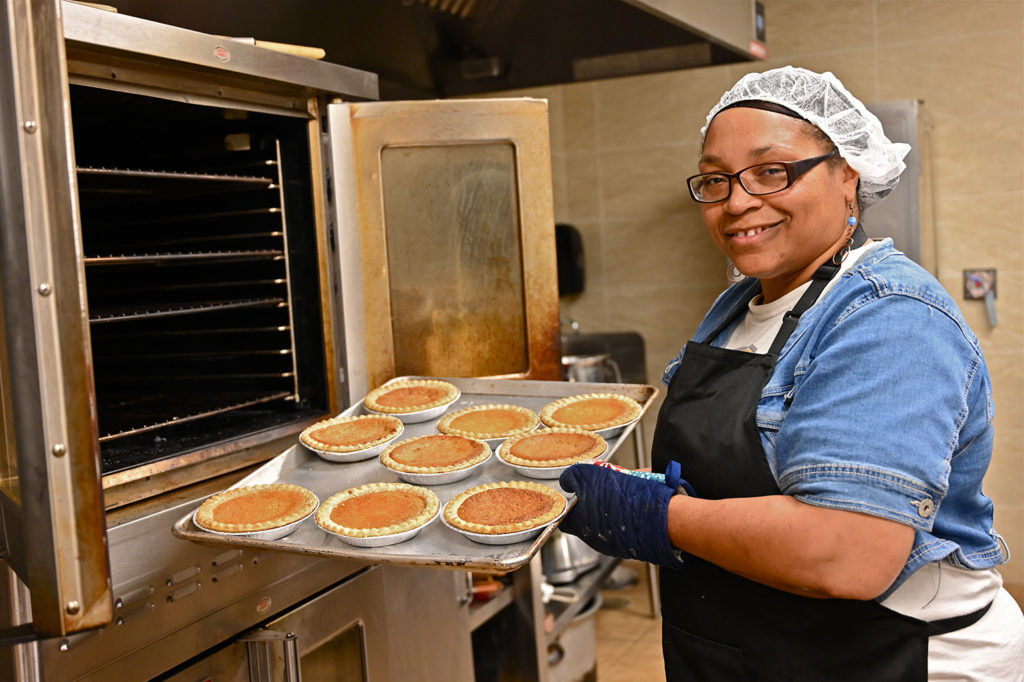
“I’ve had a lot of young people working for us, including my own kids, but really, they’re all my children.”
Driving back to Oak Park from downtown Chicago, I’d often see young men in suits and smart red bowties – members of The Nation of Islam – standing at west side street corners, selling neatly wrapped bean pies. Sometimes, I’d buy one; they were good, with a texture, and a flavor profile, much like pumpkin pie.
Such bean pies were baked by Imani Muhammad, who prepares her pies with navy beans, the legume favored by the late Elijah Muhammad in his book, “How to Eat to Live.”
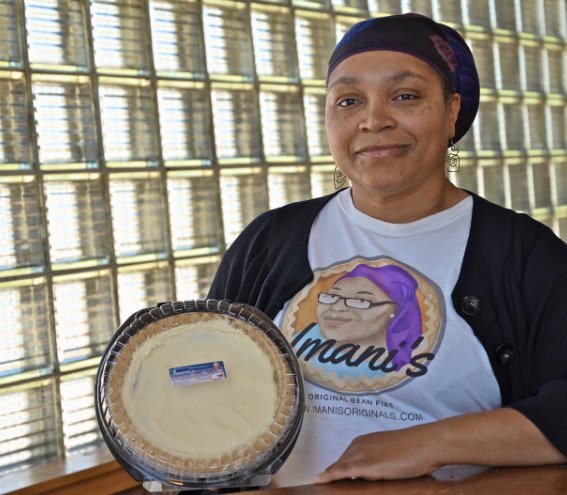
“Around the time I started this company, I was running a home daycare business,” Muhammad says, “homeschooling my own children. My business started as a homeschool project. As members of the Nation of Islam, we’d eaten bean pies, but we’d never made them. So, we made the pies as part of a fundraiser for the daycare business. People liked my pies a lot, and my husband said, ‘These are so good, you could sell them,’ but at first, I wasn’t so sure. Then people started coming to me for the pies, and I felt this was a good opportunity to show that we could make our own products.”
Encouraged by her husband, Muhammad made Imani’s Pies a family business. “My daughter was about seven at the time,” Muhammad remembers, “and the other young people got involved with making the pies…and they’re still involved! By being involved, my children and others were able to learn entrepreneurship and what I believe to be life skills. The children can get reading, writing and arithmetic in school, but when they got into the business, they came to understand things like budget and cash flow. Later those young people were able to monetize those skills.”
Corralling young children into the family business takes some organizational skills. “Sometimes the young people would want to do things other than work, and my sons would sometimes drift off for a while, but they came back. My son, Hakeem, is an artist, and you can see his murals in Water Tower Place,” Muhammad recalls with pride. “Another one of my children is working on my business plan.”
Grateful to the community that supported them from the start, and mindful of how her children were important for her business, Imani’s Originals is committed to teaching young people entrepreneurship and life/job skills. “I’ve had a lot of young people working for us, including my own kids,” says Muhammad, “but they’re all my children”
Terry Iverson, President/CEO, Iverson & Company
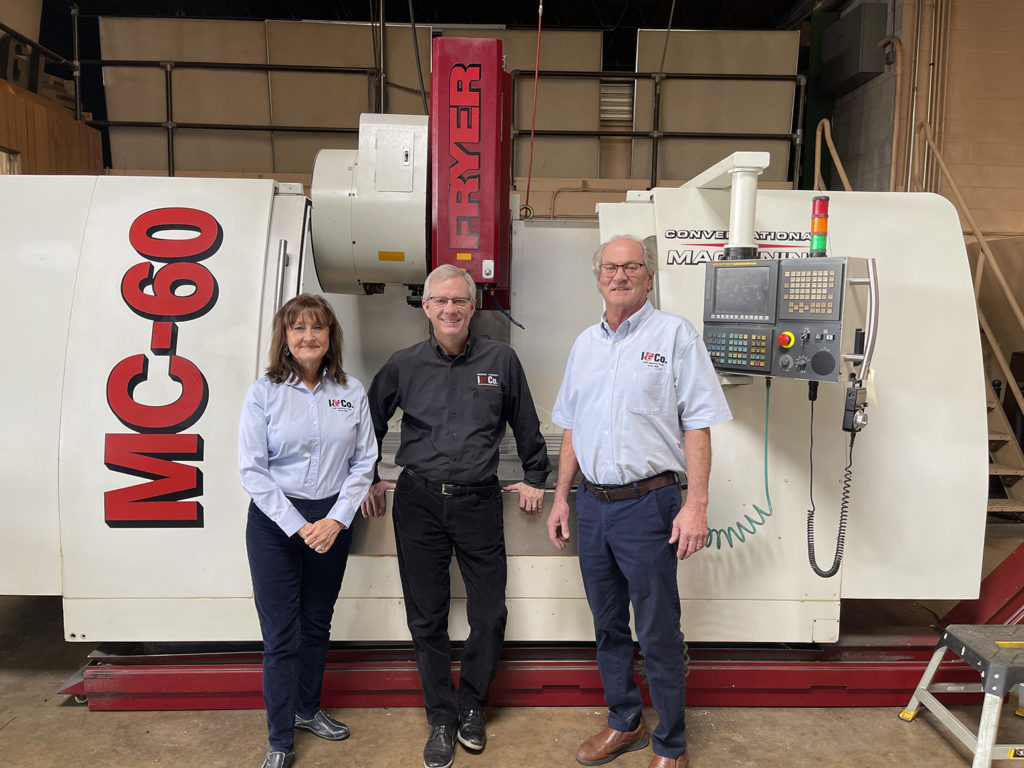
“Working with my father, wife, brother, cousins, and children has been an incredible experience. I will cherish it for the rest of my life.“
Iverson & Company offers engineered manufacturing process solutions, including turnkeys on new milling, turning, and grinding machines, as well as training and after-the-sale support. And they’ve been doing that business for quite a while.
“At a young age, my grandfather had to go to work to support his brothers, sisters, and mother,” Iverson says. “He started sweeping floors at a machine tool builder in Chicago,” and when the company moved to New York state, his grandfather was asked to go with them, but he preferred to stay in Chicago and represent the company and their product.
“Initially, I was averse to joining the family business,“ says Iverson. “My father was very much of a perfectionist, and I was not sure I could easily work well with him. It was my strength in math and science that convinced me to pursue his trade. Being able to work with my father, wife, cousins, and children has been an incredible experience. I will cherish it for the rest of my life. We have persevered through some incredible challenges and redefined ourselves many times over the decades. Your family (and employees who become part of the ‘extended family’) have your back through everything, more so than you would ever find in the corporate world.”
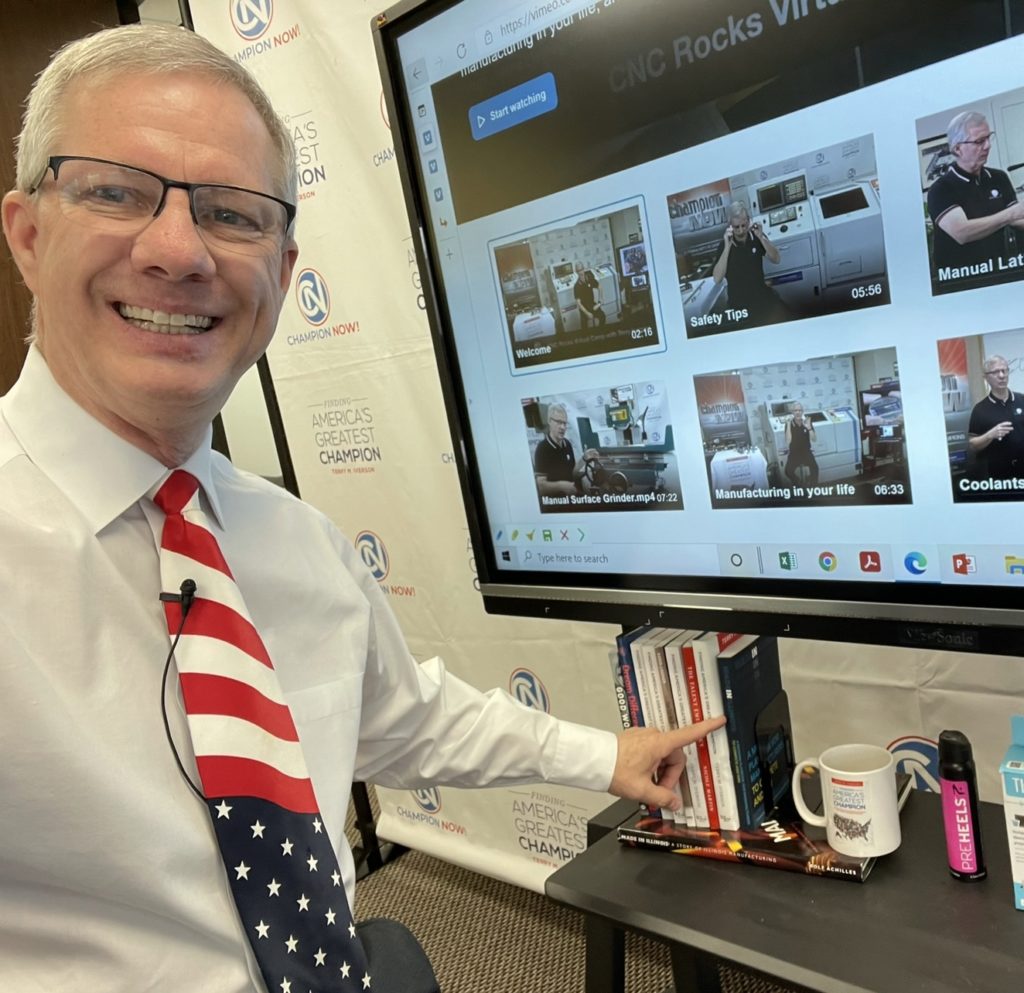
“My father was determined to share the profits with his employees, and for most of our history we were able to do that. This allowed for 40–45-year-old employees to retire in financial independence. He was most proud of that. We have also been an incredible mentoring company that has brought so many long-term employees into our industry, and many who have passed through our doors and moved onto other opportunities. Mentoring has been my greatest contribution.”
Like so many business owners with a strong sense of social responsibility, Iverson has tried to give back to his community. “In the early to mid-1990’s,” Iverson says, “I started to get involved in technical education. In 2012, I founded a 501C3, ChampionNow; ‘Champion’ is an acronym for Change How American Manufacturing’s Perceived In Our Nation. The NOW is the call to action. In 2018, I authored a book entitled ‘Finding America’s Greatest Champion.’ During COVID-19, I posted over 30 podcast interviews and wrote dozens of articles, produced 22 educational videos, started a ROKU channel, and have started a second book focused on students and parents. Find out more at www.championnow.org”
Iverson joins the chorus of those who feel that college is just one alternative, and that learning a trade may be a more suitable career path for many young people. “Parents do not realize that a 4-year college education may not be the best match for every child…and few people realize that manufacturing in the US has so much to offer to our youth, and a much more efficient path to financial independence.”
Rick Bayless, Chef/Restaurateur/Author/Television Host

“Our job is to bring joy to other people.”
Rick Bayless first became known in Chicago as the chef/owner, along with wife Deann, of Frontera Grill, and soon thereafter Topolobampo, two restaurants that introduced citizens of Chicago and the country to the diversity and majesty of regional Mexican cuisine. Now, Bayless owns several restaurants in Chicago and elsewhere, and his daughter Lanie, who has worked on cookbooks and television programs with him, has joined the business as a beverage director.
“When we decided to open a restaurant, Deann had never been in the restaurant business, but I grew up in it, and right from the start we had very clear boundaries. ‘I’m responsible for this part of the business, and you’re responsible for that part of the business.’ Point is, you have to go into it with a deep respect and belief that the other person can do that job, and that you won’t meddle with their doing that job, and that you’ll completely embrace whatever they decide to do. That attitude runs through the business, so if one of my sous chefs decides to do something in their area of responsibility, I may not agree with that decision, but I will always support that decision.”
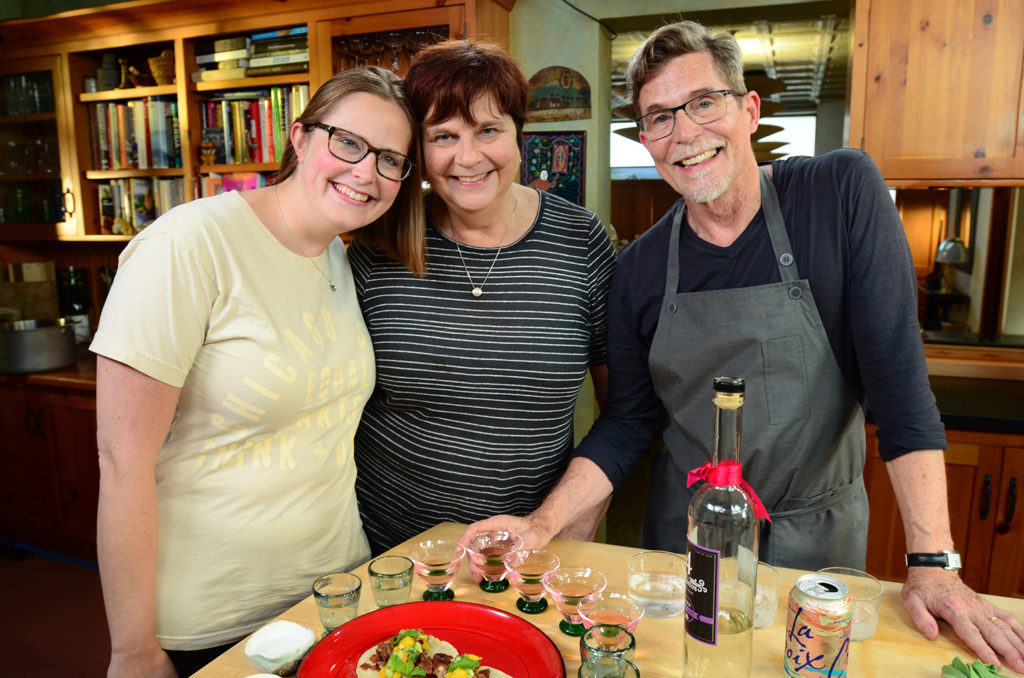
When his daughter Lanie was a young child, Bayless didn’t want her to “feel like she never saw her two parents,” which was a challenge because as most of us know, running a restaurant – or restaurants! – is more than just a full-time job. It can be all-consuming. So, Bayless tells us, “we took a storage area that was in the basement of the restaurant, and we turned it into a family room. When Lanie ‘came home from school,’ the restaurant was home, so once when the teacher asked her where she lived, Lanie told us, ‘I didn’t know what to tell her. Is home where we sleep or where we spend all our time?’”
Bayless recounts that “when my wife and I opened restaurants, we were dedicated to serving five strong lunches and dinners, and to close Sunday and Monday, so that we could have two days every week together.”
Bayless has developed many initiatives to give back to the community, including the Frontera Farmer Foundation, which provides support to those who grow our food. A year before the pandemic, Bayless remembers, “we started Impact Culinary Training, a program for people who may have been unable to go into a full culinary training program. In many overlooked communities, there is so much talent! I wanted to start a training program to give people what they need to work in a professional kitchen. We have chefs come in – we had forty chefs before the pandemic slowed us down – to tell their stories, and explain what people need to know to work in a professional kitchen. Then we set the students up with internships.”
Whether working in his restaurants or in the community, Bayless believes “Our job is to bring joy to other people,” and he’s doing that job in many ways – and extraordinarily well – for many people.
Martha Melman, Owner, Lettuce Entertain You Enterprises

“I’m so proud of the newer restaurants that my kids have helped create and are managing so successfully.”
Anyone who has lived in Chicago, even for a brief time, has likely had a meal at one of the restaurants in the Lettuce Entertain You Enterprises empire. The company owns, operates and licenses close to one hundred restaurants, including Chicago’s Shaw’s Crab House, RPM Steak, Beatrix, and Wildfire. Their first restaurant, RJ Grunts, was opened in 1971, and it’s still in operation today – and this also happened to be the restaurant where Richard Melman met Martha, his future wife. The two still go back to R.J. Grunts now and again for cheeseburgers.
Rich and Martha, as well as their three children, are deeply involved in the operation of Lettuce Entertain You restaurants. This is truly a family business, and as Martha told an interviewer for Powerful Partners, “I’m so proud of the newer restaurants that my kids have helped create and are managing so successfully.
“Richard didn’t set out to build an empire,” Martha says. “He opened one restaurant at a time. He’s impetuous and creative; I’m a little more balanced, a little slower to react, less temperamental. So, it’s a good balance; and a balance in all things is always a challenge. Balance between family time and business time is an issue for my children and my husband.”
When asked about what pet peeves she might have about Richard, she confessed, “He puts wets and dries together in the laundry basket.” A shocking revelation, primarily because it conjures the image of one of the most powerful restaurateurs in the world doing his own laundry!
The Melmans are very involved in Metropolitan Family Services. The mission and vision of this organization is to provide and mobilize the services needed to strengthen families and communities, and to be widely acknowledged as a major catalyst and resource for promoting family and community strengths. Metropolitan Family Services can realize their mission and vision by providing services in the areas of education, economic stability, emotional wellness, and empowerment.
She is also involved with the Richard and Martha Melman Foundation, which distributes gifts, grants and loans to other organizations that support the community service goals shared by Martha and all the Melmans.
Rick Woldenberg, CEO, Learning Resources, Educational Insights, Hand2Mind

“You can’t be genuine unless you’re committed to being involved in the community.”
Learning Resources, Educational Insights and Hand2Mind, family-owned by the Woldenbergs, are companies devoted to developing toys, games and other activities that promote curiosity, learning and fun. These companies serve schools and school districts, as well as families that want to entertain their children while giving them an educational leg-up. Their products are currently available in over 100 countries.
Rick Woldenberg tells us that the first family business was founded in 1916. Later, Educational Aids, founded by his father in 1965, served Montessori schools, which have traditionally emphasized hands-on learning. This experiential approach continues today.
Woldenberg started working for his family’s business when he was still a young man, but that didn’t last long: he was fired. I asked Woldenberg how that happened, and he explained that his father had asked him to make a sales call, and he resisted because it was late in the day and he and his parents had a dinner date that night. He was dismissed, and although he didn’t go to dinner that night, he did go to law school.
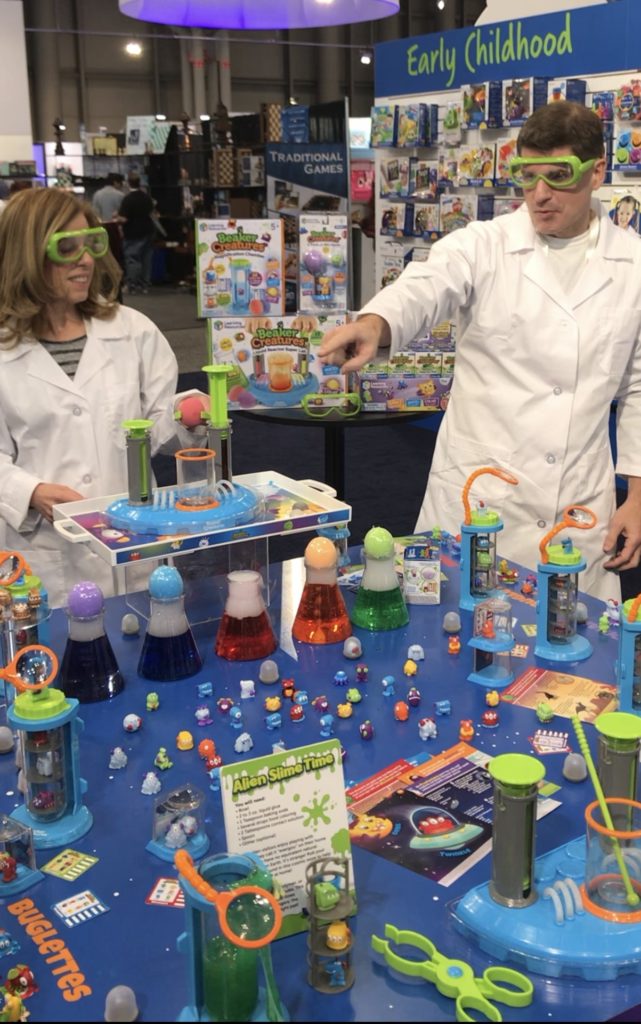
Later, after receiving his law degree, Woldenberg went back to the work at his parents’ company, saying that despite that initial hiccup, “I’m a big believer in family business because you can make decisions based on your values. Everything doesn’t have to be about money; you can think long term. Also, it’s fun to work with your family, it’s gratifying, and we’re able to give a lot to the community, a lot of taxes and a lot of jobs, and we provide business for local vendors. We’ve left our mark on Lake County and Northern Illinois. It’s wonderful to help people where you live.”
The good things that Woldenbergs’ companies provide goes well beyond the immediate community on Chicago’s North Shore. “Community involvement is a very important part of what we do,” says Woldenberg. “We sponsor local events, like the Colitis Foundation’s annual walk, and organizations like Autism Speaks, but we also make substantial product donations to organizations like Donors Choose, which enables donors to contribute directly to local schools, Toys 4 Tots, Kids in Need and many others.”
The pandemic changed our world, and Woldenberg noted that during this international health crisis, the market changed, and the three companies came together as one to pool resources. In 2020, they rolled out several free web platforms “to provide content to children whose schools were closed. We ended up putting out over 8,500 lessons, all free and downloadable in multiple languages. People could run a twelve-week program in their home for math, science, literacy, and STEM.”
“We do important work, and we’ve always been community-focused,” says Woldenberg. “You can’t be genuine unless you’re committed to being involved in the community.”
Charmaine Rickette, CEO, Uncle Remus Saucy Fried Chicken

“Carrying out my parents’ legacy gives me great joy.”
A few years ago, at Uncle Remus Saucy Fried Chicken on Madison Street in Chicago, I listened to the orders being by placed people standing in a long lunch-hour line. Just about everyone ordered the fried chicken, and most of those people asked for mild sauce, either on the side or drizzled over the top of their meals. Mild sauce is a big deal to Chicago’s fried chicken lovers.
Uncle Remus Saucy Fried Chicken, now with four Chicago locations, was founded by Gus Rickette, who first started selling chicken in the early 1960s. From the start, his fried chicken was made from scratch, double-battered and fried crisp before drizzling with his mild sauce.
For those unfamiliar with mild sauce, it’s neither a hot sauce nor a barbecue sauce, but rather something in-between. Different fried chicken operations have their own recipes.

Today, Uncle Remus Saucy Fried Chicken is run by Gus’ daughter, Charmaine Rickette, who we caught up with as she was driving out to her Madison Street store – the oldest one of her locations – to check on a major remodel that’s been going on during the pandemic.
“Serving this community for so long,” says Rickette, “we have some fourth-generation customers. And we try to do what we can to support organizations in our community. I work with Ladies of Virtue, an organization that mentors girls from grade school through college and post-college; they work to empower young women, and they were very active during the pandemic. Another group we support is Answer, Incorporated, which is committed to supporting people with autism, especially adults, because children with autism already receive a great deal of support, but then they age out of it.”
Rickette told us “About half of our employees are returning citizens,” people who have spent some time behind bars but have now paid their debt and are ready to get on with their lives. “I’ve worked with many non-profits that provide work force development, and many of those organizations are devoted to reducing recidivism.”
Though Rickette is involved with her employees’ lives and with several community organizations, her greatest source of pride is “being a part of a business that’s been going strong for over fifty years. Many businesses in our culture don’t last more than a generation, and the fact that we’ve been able to sustain our business in communities that may not get all the resources they need, and that people love our brand, well, that makes me very proud. Carrying out my parents’ legacy gives me great joy.”
Katrina Markoff, Founder/CEO, Vosges Haut-Chocolat

“People are really open to eating chocolate, and when you’re getting them to open their minds to new ideas through it, it can be a powerful change agent.”
Vosges Haut-Chocolate is a brand like Rolls Royce or Rolex: it’s at the very top of its category, a name synonymous with luxury and quality. And as with high-end cars and luxury watches, Vosges deals with chocolate, a product that has universal, enduring appeal.
Just three days after graduating from Vanderbilt University, Katrina Markoff, the future owner and creative force behind Vosges Haut-Chocolat, moved to Paris to attend Le Cordon Bleu, part of the well-regarded international network of hospitality and culinary schools. Markoff then kicked off a world tour that started with an apprenticeship in Spain under Chef Ferran Adria of El Bulli, considered by many to be “the best restaurant in the world,” and ground zero for the molecular gastronomy revolution. Her subsequent trips to Asia and Australia led to the inspiration for Vosges’ tagline: “Travel the World through Chocolate.”

As Markoff explained in an interview with Candy Industry magazine, “Chocolate is one of the most powerful words in the food dictionary. People are really open to eating chocolate, and when you’re getting them to open their minds to new ideas through it, it can be a powerful change agent.”
The range of flavors available in Vosges Haut Chocolate is a perfect reflection of Markoff’s mission to “open minds,” and this impulse is carried through with the Wild Ophelia brand that offers non-GMO Americana chocolate.
Markoff’s superb candy pushes the limit of chocolate flavors with products like Red Fire Chocolat, composed of Mexican chilis, cinnamon and dark chocolate; Black Pearl Chocolat with ginger and black sesame; and Mo’s Milk Chocolate Bacon Bar, which could be credited with fueling the trend for adding pork belly to chocolate. Her inspiration for chocolate with bacon comes from family memories. “My mom used to make chocolate chip pancakes,” remembers Markoff, “and she’d put bacon on the same plate, and then the maple syrup would run on the plate, and I’d dip the bacon in the maple syrup. I loved the idea of salt and sweet together.”
In recognition of her innovative approaches to chocolate, Markoff was named one of The Top 100 Most Creative People in Business by Fast Company and one of the 40 Under 40 by Fortune Magazine. She was also awarded by Bon Appetit the Food Artisan of the Year Award, and by Food & Wine Magazine she was named “THE innovator in chocolate to lead the U.S. through the next 30 years.”
Ajit & Sukhu Kalra, Chef-Owners, Bhoomi Modern Indian Grill
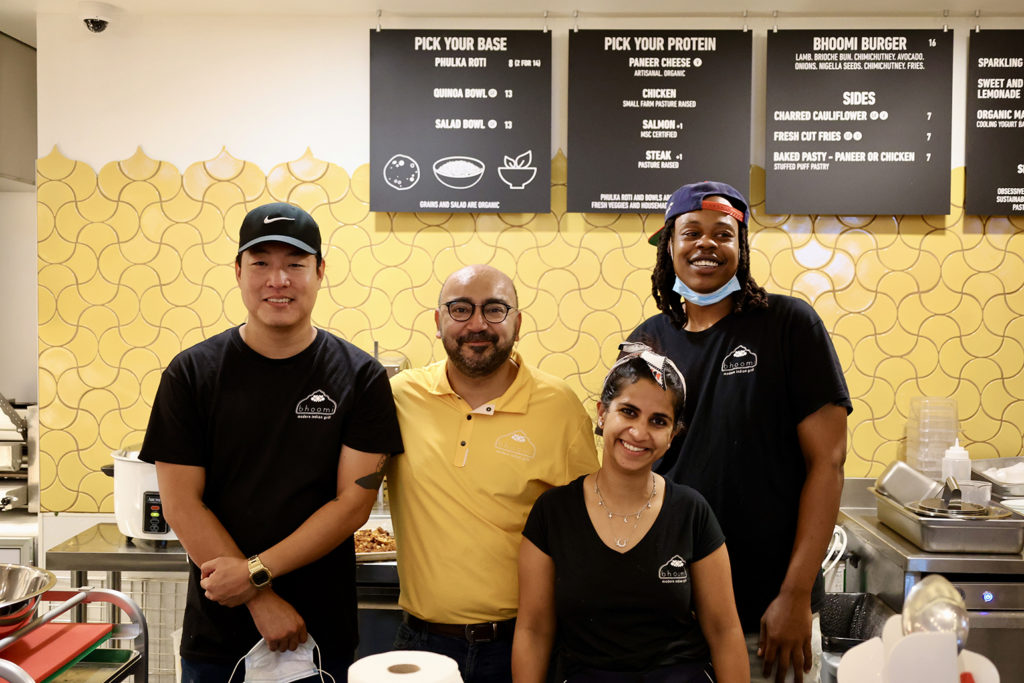
“We want to see Indian food proliferate through the country, and to make it a mainstay for the average American.”
In Urbanspace, the newly opened food court on Washington in Chicago’s Theater District, there are many familiar names, like Stan’s Donuts, Isla Filipino and Edzo’s, and then there’s… Bhoomi Modern Indian Grill, a new name, and the only startup business in this food court. Behind the counter are Ajit and Sukhu Kalra, who recently launched their first restaurant offering fresh takes on the cuisine of India, leveraging fresh ingredients rather than the usual, though delicious, stews that characterize much Indian food in Chicago. Bhoomi’s menu is driven by organic whole grains, grass-fed dairy, pasture-raised meat, “naturally grown goodness.”
Jiggs Kalra, Ajit’s father, was one of India’s most revered food writers, and Bhoomi is a kind of homage to this giant of subcontinental cuisine. “We’re a kabob-centric restaurant,” says Ajit, “offering elevated kabobs, or ‘tikkas.’ The salmon tikka on the menu was one of my dad’s creations that he popularized globally and that we re-engineered to our tastes. This dish uses a marination technique that’s hundreds of years old; we marinate the fish so that each piece has full contact with all the spices, and it explodes with flavor.”
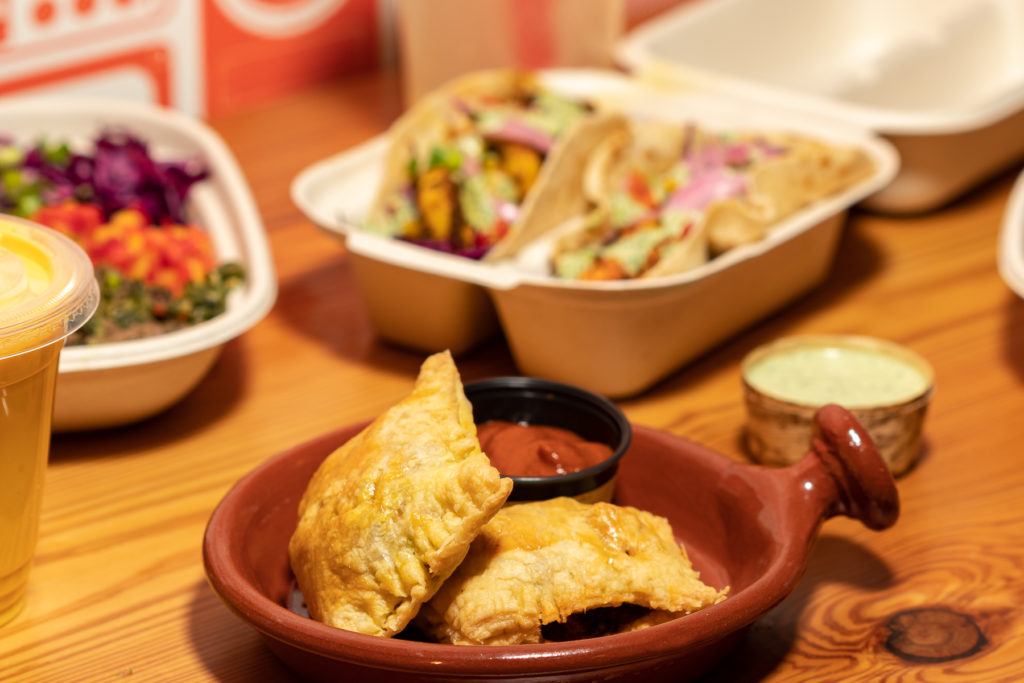
Many of Bhoomi’s dishes avoid the hot chili spice that characterizes much Indian food; they’re going for the natural goodness of the ingredient and careful spicing. As Ajit explains, “None of our food is chili-hot, because to me that detracts from the elegance, the unique and distinct flavors of the food.” Although you can amp up the heat in any of the dishes, the Kalra’s are aiming to reveal the natural beauty of the ingredients, which can sometimes be lost in sometimes quite spicy stews like rogan josh and nihari.
“Making money, for us, is truly secondary,” says Ajit. “We want to see Indian food proliferate through the country, and to make it a mainstay for the average American household. We want for people, born and raised in the Midwest, to have access to — and seek out – the flavors of Indian food.”
Bhoomi in Urbanspace is not the first food operation from the Kalras. “I had a food truck for a season,” says Sukhu, “before I got pregnant. But running a food truck is difficult business. You really need a brick-and-mortar restaurant to be successful because, first of all, when I started out, you couldn’t cook on the trucks and the parking was so limited; there were too many operational complications. But we loved making food for people.”
Sitting in the Urbanspace dining area and watching Ajit and Sukhu working with their people behind the counter, moving fast, serving customers and preparing food, this seemed to us a reflection of the American spirit of hard work and entrepreneurship. Bhoomi is now a counter-service restaurant, and the Kalra’s have big dreams for new expansion, and like many family businesses, they’re building on the past as they look to the future.
More from Better:
- Chicago Chefs Team Up with WTTW on Animated Series ‘Food Thoughts’ to Encourage Healthy Discussions About Food
- Donate or Join the Walk to Help Chicagoland Make Progress Toward a World Free of Alzheimer’s
- The Nature of Addiction: You Don’t Get Addicted to the Drug, You Get Addicted to the Experience

David is a supporter of S.A.C.R.E.D., Saving Agave for Culture, Recreation, Education and Development, an organization founded by Chicagoan Lou Bank and dedicated to increasing awareness of agave distillates and ensuring that the benefits of that awareness flow to the villages of Oaxaca, Mexico. Currently, S.A.C.R.E.D is funding the development of agave farms, a library and water preservation systems for the community of Santa Maria Oxcatlan, Oaxaca.
